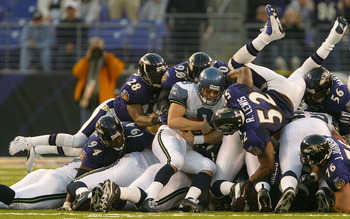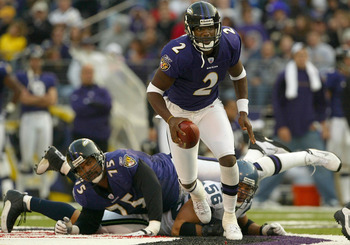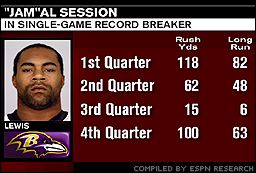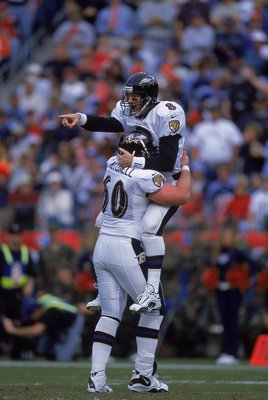Last week, I began a five part series in which I plan to unveil the 20 greatest games in Baltimore Ravens franchise history. As noted in the first article, these games were selected because of importance and significance.
In order to qualify and be on the list, the games had to meet the following criteria. First, the game had to be important to the outcome of the season in terms of winning a division title, playoff game or in two instances, the Super Bowl.

Vinny Testaverde gives the ball to a lucky fan after first ever Ravens TD
Second, if the game made the list and did not meet the first criteria, then it must still have some sort of relevance in team history. Examples of that would be if a player broke an NFL record (there’s a hint), or the Ravens did something as a team that stands to this very minute.
Lastly, I decided the order and while I’m sure you may or may not disagree on exactly where each of these games belong, one thing I think we can all agree on is the fact that happened at all.
Before I give you numbers 16-13, let us recap 20-17.
No. 20 September 1, 1996: The Return of the NFL to Baltimore: Football returns to Baltimore after 13 seasons. Vinny Testaverde scores first ever touchdown as Baltimore Ravens defeat Oakland Raider 19-14
No.19 November 29, 1998: The Colts Return to Baltimore: Former Indianapolis Colts QB and current Ravens QB, Jim Harbaugh lives up to his nickname of Captain Comeback as he led the Ravens back from a 24-10 deficit to beat rookie Colts QB, Peyton Manning 38-31. Following the game, Harbaugh delivered the game ball to Baltimore’s greatest all-time signal caller, Johnny Unitas as he watched the victory from the Ravens sidelines.
No. 18 September 10, 2000: Ravens Get First Ever Victory over Jaguars: Ravens QB Tony Banks throws five touchdown passes, including the final one to new Ravens tight end Shannon Sharpe with 35 seconds to play to give the Ravens a 39-36 come from behind win. This win was significant on two fronts. The Ravens and Jags played in the same division at the time and this was the first ever win over Jacksonville. The victory also gave the Ravens their first 2-0 start in their brief five-year history. It also help set the tone for a year that culminated with the franchise’s first ever Super Bowl Championship
No. 17 October 3, 2010: Flacco Finally Wins a Big One in Pittsburg: Ravens QB Joe Flacco get his first big win in the Steele City in come from behind fashion as he hit TJ Houshmandzadeh with 33 seconds to play to give the Ravens a 17-14 come from behind win.
As you can also see, any win over Pittsburgh, regardless of season relevance or significant contribution to team history is apt to make the list as well. This installment has two games from the 2003 season and two games form the Super Bowl winning season of 2000. So without further ado, here are the next four games to make the list.
No.16 November 23, 2003: Ravens Wright Ship In Come From Behind win Vs. Seahawks:
Up until Oct 30, 2011, which is when Joe Flacco led the Ravens back from a 24-3 first half deficit to beat the Arizona Cardinals, the 2003 Week 16 contest at home, Vs. Seattle, was the largest deficit the Ravens had overcome in franchise history to win a game. It still represents the largest fourth quarter comeback in franchise history.
The Cardinals game did not make the list but this game—–simply could not be left off any list when talking great Ravens games. Not only because of the comeback could it be left off but considering where the team was at the time and who was playing quarterback, this game had to make the list.
The Ravens were quickly becoming a locker room divided during the 2003 season and the second greatest comeback win in franchise history (first at the time) could not have come at a better time for the Ravens and their fans.
Baltimore dropped to a disappointing 5-5 after losing their previous two games and the frustration was starting to become very apparent. The Ravens third ranked defense and special team was again carrying the Ravens offense and their last ranked passing attack.
Following an injury to the Ravens unimpressive QB, Kyle Boller during a week nine contest against the Rams, Baltimore turned to Dallas Cowboys reject backup QB, Anthony Wright.

The Ravens “D” finally made a stand against the Hawks “O” late in the game
As expected, Wright fared no better after taking over for Boller. The week before, during an overtime loss to the Dolphins, Wright threw for a measly 112 yards and two interceptions in leading the offense to just six points.
Therefore, it was understandable when a third of the 64 thousand in attendance at PSInet Stadium walked out after halftime of the Seattle game with the Ravens trailing 17-3. A Ravens comeback win seemed out of the question and just plain impossible.
Things really appeared bleak, as Wright and the Ravens offense could not reach the end zone in the first half, and the vaunted Ravens defense could not keep the Seahawks from the end zone during the two middle quarters.
Even when things went right, the Ravens still could not make up much ground. Though Wright had thrown three touchdown passes to Marcus Robinson in the third quarter, leading the Ravens to 21 points, the defense allowed the Seahawks QB Matt Hasselbeck to toss two of his own in the quarter, one an 80-yard strike to Darrell Jackson. After an early fourth quarter TD pass from Hasselbeck to Bobby Engram, Seattle was comfortably ahead 41-24.
The Ravens special teams started the comeback started when Ed Reed blocked a punt off the foot of Tom Rouen. Reed then scooped up the ball and scored a 16-yard touchdown. The score by Reed cut the Seattle lead to 10 points but time was not on the Ravens side. Just 6:41 remained in the game, and the Ravens defense would have to do something they failed to do most of the game, stop the Seattle offense cold. Points did not matter for the Seahawks, a couple of first downs and the game could be over.

Anthony Wright
On the Seattle possession following the blocked punt, the Ravens D managed to force a turnover as the Seahawks were again driving. Linebacker Ray Lewis stripped Seattle fullback Mack Strong, and Wright led the Ravens 71 yards on a drive and cut the Seattle lead to three after his fourth TD pass to Marcus Robinson.
The biggest defensive stand of the season occurred on the next Seahawks possession. Needing less than a yard on fourth-and-one to run out the clock and win the game, the Ravens stuffed Seattle QB Matt Hasselbeck (play pictured above) on a sneak to take over on downs.
With the help of a 45-yard pass interference penalty, Wright got the Ravens into field goal territory and with no time left on the clock, Matt Stover hit a 40-yard field goal to send the game into overtime.
The Ravens D came up with their third straight stop of the hot Seattle offense when they forced the Seahawks to punt on the first possession of overtime. Wright then took over again, as he scrambled for eight yards and then connected on two of three passes for 29 yards to set up the 40-yard game-winning field goal by Stover.
The win boosted the team’s confidence in each other and behind the confidence of Anthony Wright and Jamal Lewis’ 2000 yard rushing season, the Ravens won four of their next five games to win their first AFC North crown and capture their third playoff berth in four seasons.
No. 15 September 14, 2003: Jamal Lewis Breaks Single Game Rushing Record

Lewis on his way to 295
Ravens running back Jamal Lewis literally carried the offense on his back for the entire 2003 season. The Ravens relied very heavily on Lewis, as offensive genius and head coach Brian Billick’s team boasted the NFL’s worst passing attack with Kyle Boller and Anthony Wright under center.
Lewis, who missed the entire 2001 season with a torn ACL, the second of his career (Lewis tore an ACL while playing at Tennessee) made his money running against the Browns defense in his career.
In 12 career games, Lewis rushed for 1,524 yards (127 yards per game) and scored eight touchdowns against Cleveland. On this September day in Baltimore, Lewis would shatter the single game rushing record of 278-yards set by Corey Dillon of Cincinnati during a game against Denver in October of 2000 by rushing for 295 yards on 30 carries.
Lewis wasted little time rushing for the record. On the second play of the game, he took a handoff and ran for an 82-yard touchdown. Lewis followed that up with a 63-yard rushing TD run early in the fourth quarter, and broke the record on a 3-yard run with 6:55 remaining in the game. The Ravens, behind Lewis defeated Cleveland 33-14 as the defense held the Browns to just 175 yards while forcing three turnovers in the process.
One of those turnovers was Ed Reed’s first career interception returned for a touchdown. 
The single game rushing record of 275-yards was held by Walter Payton for 23-years before Dillon broke the mark in 2000. Starting with Dillon, who held the mark for a little under three years, the record fell three times in a span of seven NFL seasons. Lewis held the record for a little over four years until its current holder, the Vikings Adrian Peterson, broke it as a rookie in 2007. Peterson rushed for one more yard than Lewis in a game against the San Diego Chargers during a November contest that season.
Lewis went on to win many post-season honors following the 2003 season, rushing for 2066 yards. He came within 40 yards of breaking Eric Dickerson’s single season all-time mark as he eclipsed the 2000-yard plateau during the final regular season home game in a win against the Pittsburgh Steelers.
Instead of figuring out how to stop Lewis, the Browns just signed him as a free agent in 2007. He played three seasons in Cleveland rushing for an additional 2,806 yards and 13-touchdowns. Cleveland was 2-3 vs. the Ravens during Lewis’ tenure as a Brownie, with both wins coming in the Ravens 5-11 season of 2007. Lewis rushed for 297-yards against his old team, which ironically is just two yards more that the 295 Lewis rushed for to break the NFL single game rushing record against his new one. He would also score two touchdowns in five games against Baltimore.
No.14. December 10, 2000: Happy Berth Day

Art Modell flanked by Sharpe and Lewis
The Ravens were so close to clinching the franchise’s first playoff berth, they could smell it. At 9-4 the Ravens controlled their own destiny. They were locked in a battle with the Tennessee Titans for the AFC Central title, as Baltimore entered their Week 14 contest hosting the San Diego Chargers having won four in a row and rested from having a late Week 13 bye.
With the holiday season in full swing, PSINet Stadium was a “Festivus” place to be on Dec 10 2000 as Ryan Leaf and the dismal 1-12 Chargers visited the Charm City.
Speaking of a “Festivus” occasion, prior to the start of the game, the Ravens honored the man that brought football back to Baltimore with an extremely moving pre-game ceremony. Art Modell, who was in his 40th year of owning and NFL franchise, said he had just one goal in mind before he retired, win a Super Bowl.
As owner of the Cleveland Browns, Modell was close on several occasions. He watched as his Browns lost three AFC Championship games by a total of 24 points. All of those games to John Elway and the Denver Broncos.
Shannon Sharpe and Ray Lewis escorted Modell to his ceremony,as each player locked elbows with Mr. Modell leading him to the field for his moment. The picture is still one of the most popular in team history. Lewis and Sharpe as well as the rest of the team would honor Modell further with more than a pre-game ceremony against the helpless Bolts. They earned the franchise’s first ever playoff berth with a convincing 24-3 win.
The Ravens D was dominant as usual in the victory, as they beat up on Leaf, and held the Chargers offense to just 128 total yards while forcing five turnovers.
Instructed by their head coach, Brian Billick, not to use the word playoffs at any point in the season until they actually earned the right by clinching a berth, many Ravens players could be seen on the sidelines screaming the word with just minutes left in the game.
The Ravens, who entered the game as winners of four straight would not lose a game the rest of the season, including Super Bowl XXXV in Tampa Florida.
No.13 November 12, 2000: Ravens End Titans Win Streak at Adelphia

Trent Dilfer jumps for joy after Patrick Johnson’s late TD catch
Every NFL team has a nemesis in the league. A team that prevents them from getting over the final hurdle, and moving onto bigger and better things. We all know who that team has been for the Ravens since their arrival in 1996, so there is no need to give them any more press.
However, in Nashville, and for the fans of the Tennessee Titans that team is the very own Baltimore Ravens. Back when the Ravens and Titans were rivals in the AFC Central, the Ravens seemed to end the Titans hopes and dreams on a regular basis. Even still to this day, the Ravens continue to torture fans in the music city but not like, they did during the 2000 season.
The Titans and Ravens met in a divisional showdown during week 11 of the 2000 season. Many gave the upstart Ravens little chance of winning in Nashville. Why would Baltimore win at Adelphia Coliseum? No team had done so since the Stadium opened for play the year before. Tennessee set an NFL record with 12 straight wins to open a new stadium and was 8-1, holding a three game lead over the 6-4 Ravens heading into the contest.
The Ravens with Trent Dilfer at quarterback jumped out to a 14-0 lead but behind Steve McNair, the Titans would come back to tie the game at 17 early in the fourth quarter.
The Ravens looked to be driving down the field for what would become the go-ahead score late in the fourth quarter. Instead, Dilfer made a bad read on the play, and threw the ball right to Titans safety Perry Phenix, who ran the ball 87-yards for the go-ahead touchdown.
Dilfer said following the game, “I thought I got 35 [Phenix] to move just enough to get the slant in behind him. You do stupid things once in a while. That was a terrible time to do it.”
The play, which seemed devastating to Baltimore’s chances to win the game, was not as bad as it could have been. Known as Automatic Al throughout his 17-year NFL career, Titans kicker Al Del Greco missed the extra point, and in the process rejuvenated a down Ravens sideline. The miss opened the door for the Ravens to win in regulation and unfazed by the pick six he had just thrown, Dilfer came back onto the field and promptly led the Ravens on a nine-play, 70-yard drive.

“Maybe so—but not today”
The final play was a Dilfer pass to Patrick Johnson just over the goal line for the game-tying touchdown. After the replay upheld the call on the field, and Matt Stover added the game winning extra point, the Ravens became legitimate AFC contenders.
The Titans still got one last chance to win the game, but Automatic Al missed from 43-yards setting off a wild Ravens sideline celebration.
While speaking to his team following the contest, the Ravens ever-arrogant head coach Brian Billick, held up a copy of the current Sports Illustrated that had the Titans on the cover and proclaimed Tennessee to be the best team in the NFL. “This says the Titans are the best team in the NFL and maybe so, maybe they are” Billick said to the happy payers, “but not today”—– The locker room erupted in celebration but Billick was not finished and would end his famous locker room speech, which would be replayed on the Adelphia Coliseum scoreboard prior to the Ravens and Titans playoff game later that January by telling his players “When you go into a lion’s den, you don’t tiptoe in. You carry a spear. You go in screaming like a banshee and say, ‘Where’s the son of a bitch?”
I have a feeling you will be reading about that January game a little later on in this series but this game provided the final boost of confidence the Ravens seemed to need to become the eventual SB Champs.
On Wednesday, we will break the Top 10, as we make it to number nine in the countdown. As always, comments are welcome. I would love to know which Ravens game you think is the greatest of all time.